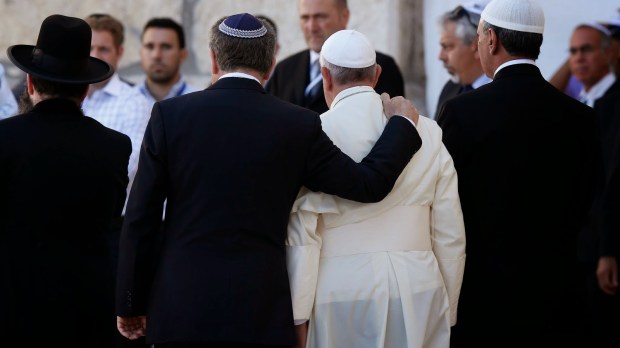FromCNS:
Catholics are called to witness to their faith in Jesus before all people, including Jews, but the Catholic Church “neither conducts nor supports” any institutional missionary initiative directed toward Jews, says a new document from a Vatican commission. How God will save the Jews if they do not explicitly believe in Christ is “an unfathomable divine mystery,” but one which must be affirmed since Catholics believe that God is faithful to his promises and therefore never revoked his covenant with the Jewish people, it says. In the statement, “The Gifts and the Calling of God Are Irrevocable,” the Pontifical Commission for Religious Relations With the Jews gives thanks for 50 years of Catholic-Jewish dialogue and looks at some of the theological questions that have arisen in the dialogue and in Catholic theology since the Second Vatican Council.
The full text of the document is here.
Elaborating on the section noted above:
The Catholic Church neither conducts nor supports any specific institutional mission work directed towards Jews. While there is a principled rejection of an institutional Jewish mission, Christians are nonetheless called to bear witness to their faith in Jesus Christ also to Jews, although they should do so in a humble and sensitive manner, acknowledging that Jews are bearers of God’s Word, and particularly in view of the great tragedy of the Shoah. The concept of mission must be presented correctly in dialogue between Jews and Christians. Christian mission has its origin in the sending of Jesus by the Father. He gives his disciples a share in this call in relation to God’s people of Israel (cf. Mt 10:6) and then as the risen Lord with regard to all nations (cf. Mt 28:19). Thus the people of God attains a new dimension through Jesus, who calls his Church from both Jews and Gentiles (cf. Eph 2:1122) on the basis of faith in Christ and by means of baptism, through which there is incorporation into his Body which is the Church (“Lumen gentium”, 14). Christian mission and witness, in personal life and in proclamation, belong together. The principle that Jesus gives his disciples when he sends them out is to suffer violence rather than to inflict violence. Christians must put their trust in God, who will carry out his universal plan of salvation in ways that only he knows, for they are witnesses to Christ, but they do not themselves have to implement the salvation of humankind. Zeal for the “house of the Lord” and confident trust in the victorious deeds of God belong together. Christian mission means that all Christians, in community with the Church, confess and proclaim the historical realisation of God’s universal will for salvation in Christ Jesus (cf. “Ad gentes”, 7). They experience his sacramental presence in the liturgy and make it tangible in their service to others, especially those in need. It is and remains a qualitative definition of the Church of the New Covenant that it consists of Jews and Gentiles, even if the quantitative proportions of Jewish and Gentile Christians may initially give a different impression. Just as after the death and resurrection of Jesus Christ there were not two unrelated covenants, so too the people of the covenant of Israel are not disconnected from ‘the people of God drawn from the Gentiles’. Rather, the enduring role of the covenant people of Israel in God’s plan of salvation is to relate dynamically to the ‘people of God of Jews and Gentiles, united in Christ’, he whom the Church confesses as the universal mediator of creation and salvation. In the context of God’s universal will of salvation, all people who have not yet received the gospel are aligned with the people of God of the New Covenant. “In the first place there is the people to whom the covenants and promises were given and from whom Christ was born according to the flesh (cf. Rom 9:4-5). On account of their fathers this people remains most dear to God, for he does not repent of the gifts he makes nor of the calls he issues (cf. Rom 11:28-29)” (“Lumen gentium”, 16).

